human, human being, human race, mankind, man, person, people, soul, creature区别
mankindhumanhumanbeing的区别
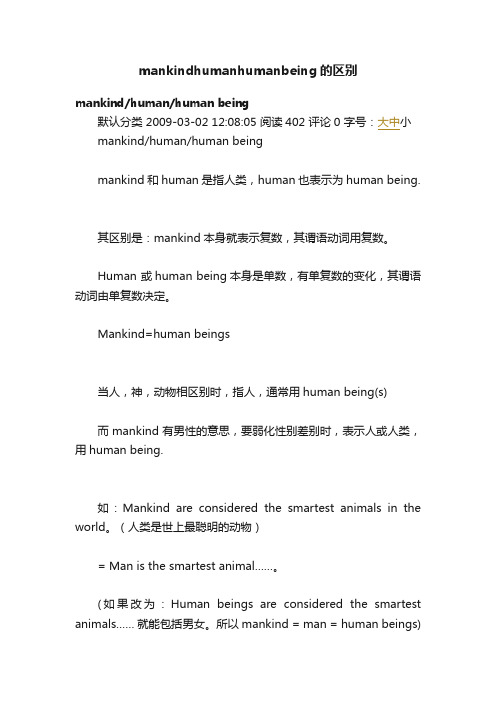
mankindhumanhumanbeing的区别mankind/human/human being默认分类 2009-03-02 12:08:05 阅读402 评论0 字号:大中小mankind/human/human beingmankind和human是指人类,human也表示为human being.其区别是:mankind本身就表示复数,其谓语动词用复数。
Human 或human being本身是单数,有单复数的变化,其谓语动词由单复数决定。
Mankind=human beings当人,神,动物相区别时,指人,通常用human being(s)而mankind有男性的意思,要弱化性别差别时,表示人或人类,用human being.如:Mankind are considered the smartest animals in the world。
(人类是世上最聪明的动物)= Man is the smartest animal……。
(如果改为:Human beings are considered the smartest animals…… 就能包括男女。
所以 mankind = man = human beings)(注意:mankind 后面动词要用复数,而 man 的后面动词,则用单数)另外,human还有形容词性,意思是:人性的,人类的,有同情心的,人力的,如:He is human. 他有人性。
Human resources 人力资源People是指人们或人民,是集体名词,谓语动词用复数。
另一个意思是民族,其复数形式表示民族。
以下几个词组也表示人或人类:human race ,man, mankind people,humankind , men , person , people。
“人”与“人”的不同用法
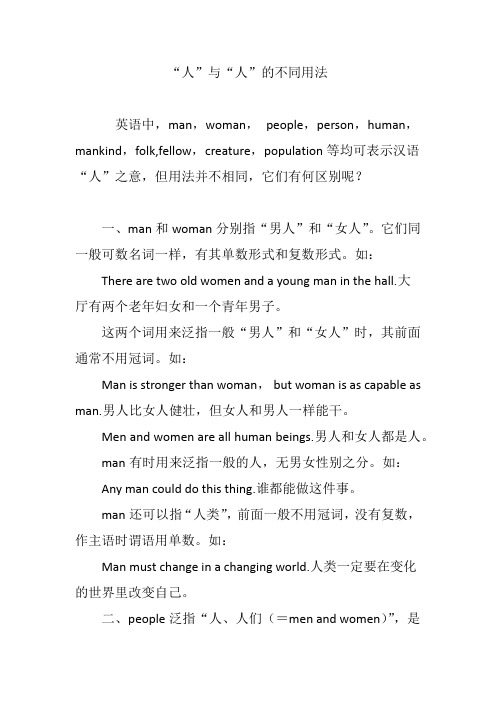
“人”与“人”的不同用法英语中,man,woman,people,person,human,mankind,folk,fellow,creature,population等均可表示汉语“人”之意,但用法并不相同,它们有何区别呢?一、man和woman分别指“男人”和“女人”。
它们同一般可数名词一样,有其单数形式和复数形式。
如:There are two old women and a young man in the hall.大厅有两个老年妇女和一个青年男子。
这两个词用来泛指一般“男人”和“女人”时,其前面通常不用冠词。
如:Man is stronger than woman,but woman is as capable as man.男人比女人健壮,但女人和男人一样能干。
Men and women are all human beings.男人和女人都是人。
man有时用来泛指一般的人,无男女性别之分。
如:Any man could do this thing.谁都能做这件事。
man还可以指“人类”,前面一般不用冠词,没有复数,作主语时谓语用单数。
如:Man must change in a changing world.人类一定要在变化的世界里改变自己。
二、people泛指“人、人们(=men and women)”,是集体名词,作主语时,谓语动词用复数。
如:Some people speak English in this country.在这个国家一部分人讲英语。
people与定冠词the连用时,其含意为“人民”。
如:The Japanese government has to say sorry to the Chinese people at this issue.在这个问题上,日本政府不得不向中国人民道歉。
people还表示“民族、种族”,这时可与不定冠词连用,也有复数形式。
如:The Chinese people are a hardworking people.中华民族是一个勤劳的民族。
人类及称谓词汇
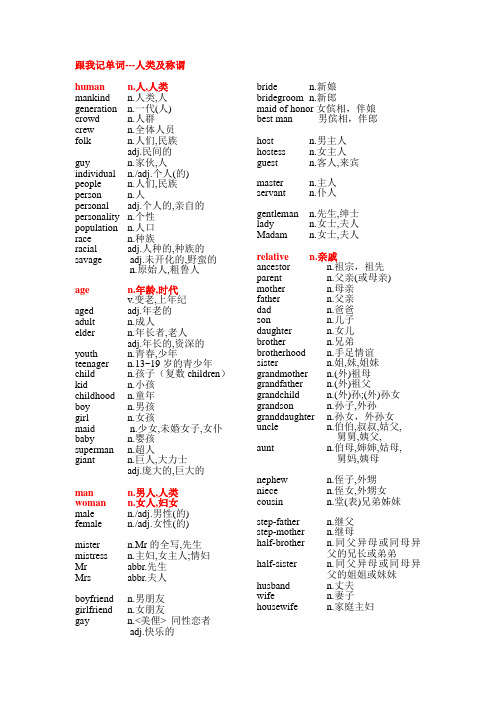
跟我记单词---人类及称谓human n.人,人类mankind n.人类,人generation n.一代(人)crowd n.人群crew n.全体人员folk n.人们,民族adj.民间的guy n.家伙,人individual n./adj.个人(的)people n.人们,民族person n.人personal adj.个人的,亲自的personality n.个性population n.人口race n.种族racial adj.人种的,种族的savage adj.未开化的,野蛮的n.原始人,粗鲁人age n.年龄,时代v.变老,上年纪aged adj.年老的adult n.成人elder n.年长者,老人adj.年长的,资深的youth n.青春,少年teenager n.13~19岁的青少年child n.孩子(复数children)kid n.小孩childhood n.童年boy n.男孩girl n.女孩maid n.少女,未婚女子,女仆baby n.婴孩superman n.超人giant n.巨人,大力士adj.庞大的,巨大的man n.男人,人类woman n.女人,妇女male n./adj.男性(的)female n./adj.女性(的)mister n.Mr的全写,先生mistress n.主妇,女主人;情妇Mr abbr.先生Mrs abbr.夫人boyfriend n.男朋友girlfriend n.女朋友gay n.<美俚> 同性恋者adj.快乐的bride n.新娘bridegroom n.新郎maid of honor女傧相,伴娘best man 男傧相,伴郎host n.男主人hostess n.女主人guest n.客人,来宾master n.主人servant n.仆人gentleman n.先生,绅士lady n.女士,夫人Madam n.女士,夫人relative n.亲戚ancestor n.祖宗,祖先parent n.父亲(或母亲) mother n.母亲father n.父亲dad n.爸爸son n.儿子daughter n.女儿brother n.兄弟brotherhood n.手足情谊sister n.姐,妹,姐妹grandmother n.(外)祖母grandfather n.(外)祖父grandchild n.(外)孙;(外)孙女grandson n.孙子,外孙granddaughter n.孙女,外孙女uncle n.伯伯,叔叔,姑父,舅舅,姨父,aunt n.伯母,婶婶,姑母,舅妈,姨母nephew n.侄子,外甥niece n.侄女,外甥女cousin n.堂(表)兄弟姊妹step-father n.继父step-mother n.继母half-brother n.同父异母或同母异父的兄长或弟弟half-sister n.同父异母或同母异父的姐姐或妹妹husband n.丈夫wife n.妻子housewife n.家庭主妇。
“人”与“人”的不同用法

“人”与“人”的不同用法英语中,man,woman,people,person,human,mankind,folk,fellow,creature,population等均可表示汉语“人”之意,但用法并不相同,它们有何区别呢?一、man和woman分别指“男人”和“女人”。
它们同一般可数名词一样,有其单数形式和复数形式。
如:There are two old women and a young man in the hall.大厅有两个老年妇女和一个青年男子。
这两个词用来泛指一般“男人”和“女人”时,其前面通常不用冠词。
如:Man is stronger than woman,but woman is as capable as man.男人比女人健壮,但女人和男人一样能干。
Men and women are all human beings.男人和女人都是人。
man有时用来泛指一般的人,无男女性别之分。
如:Any man could do this thing.谁都能做这件事。
man还可以指“人类”,前面一般不用冠词,没有复数,作主语时谓语用单数。
如:Man must change in a changing world.人类一定要在变化的世界里改变自己。
二、people泛指“人、人们(=men and women)”,是集体名词,作主语时,谓语动词用复数。
如:Some people speak English in this country.在这个国家一部分人讲英语。
people与定冠词the连用时,其含意为“人民”。
如:The Japanese government has to say sorry to the Chinese people at this issue.在这个问题上,日本政府不得不向中国人民道歉。
people还表示“民族、种族”,这时可与不定冠词连用,也有复数形式。
如:The Chinese people are a hardworking people.中华民族是一个勤劳的民族。
人类英语单词
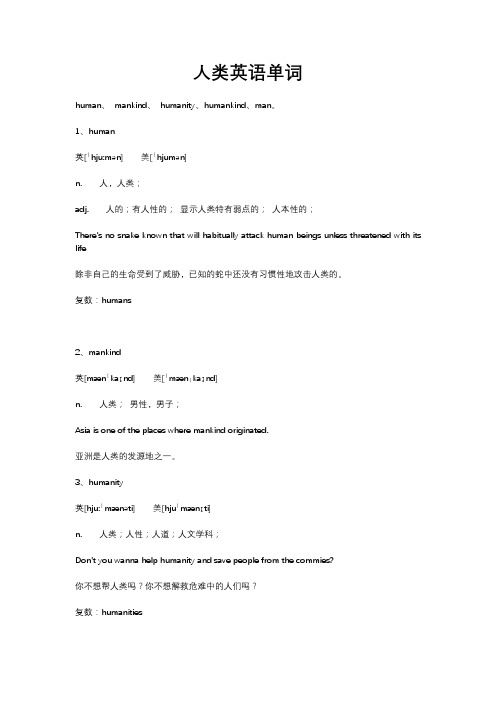
人类英语单词human、mankind、humanity、humankind、man。
1、human英[ˈhju:mən] 美[ˈhjumən]n. 人,人类;adj. 人的;有人性的;显示人类特有弱点的;人本性的;There's no snake known that will habitually attack human beings unless threatened with its life除非自己的生命受到了威胁,已知的蛇中还没有习惯性地攻击人类的。
复数:humans2、mankind英[mænˈkaɪnd] 美[ˈmænˌkaɪnd]n. 人类;男性,男子;Asia is one of the places where mankind originated.亚洲是人类的发源地之一。
3、humanity英[hju:ˈmænəti] 美[hjuˈmænɪti]n. 人类;人性;人道;人文学科;Don't you wanna help humanity and save people from the commies?你不想帮人类吗?你不想解救危难中的人们吗?复数:humanities4、humankind英[ˌhju:mənˈkaɪnd] 美[ˈhjumənˌkaɪnd]n. 人类;Capitalism and neo-liberalism offers only rottenness and selfishness to humankind.资本主义和新自由主义的提供者对人类只有腐烂和自私。
5、man英[mæn] 美[mæn]n. 男人;人类;男子汉;雇工;vt. 使振作;操纵;给…配置人员;在…就位;int. (表示惊讶、气愤等)嘿,天哪;It must be stated that this illness is one of the most complex conditions known to man. 必须声明,这种疾病是人类已知的最为复杂的疾病之一。
分类串联记忆英语词汇
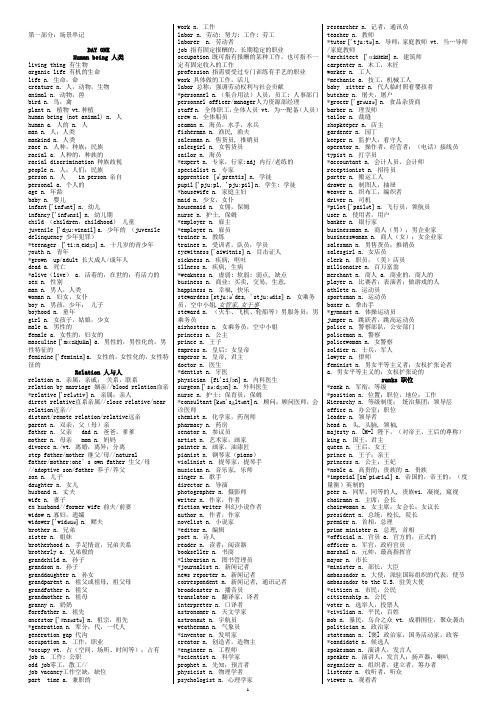
第一部分:场景串记DAY ONEHuman being 人类living thing 有生物organic life 有机的生命life n. 生命,命creature n. 人,动物,生物animal n. 动物,兽bird n. 鸟,禽plant n. 植物 vt.种植human being (not animal) n. 人human a. 人的 n. 人man n. 人;人类mankind n. 人类race n. 人种,种族;民族racial a. 人种的,种族的racial discrimination 种族歧视people n. 人;人们;民族person n. 人 in person 亲自personal a. 个人的age n. 年龄baby n. 婴儿infant ['infənt] n. 幼儿infancy ['infənsi] n. 幼儿期child (children,childhood)儿童juvenile ['dʒu:vinail] a. 少年的(juvenile delinquency 少年犯罪)*teenager ['ti:nˌeidʒə] n. 十几岁的青少年youth n. 青年*grown up/adult 长大成人/成年人dead a. 死亡*alive(live) a. 活着的,在世的;有活力的sex n. 性别man n. 男人,人类woman n. 妇女,女仆boy n. 男孩,少年;儿子boyhood n. 童年girl n. 女孩子,姑娘,少女male a. 男性的female a. 女性的,妇女的masculine ['mɑ:skjulin] a. 男性的,男性化的,男性特征的feminine ['feminin] a. 女性的,女性化的,女性特征的Relation 人与人relation n. 亲属,亲戚;关系,联系relation by marriage 姻亲//blood relation血亲*relative ['relətiv] n. 亲属;亲人direct relative直系亲属//close relative/near relation近亲//distant/remote relation/relative远亲parent n. 双亲,父(母)亲father n. 父亲 dad n. 爸爸,爹爹mother n. 母亲 mom n. 妈妈divorce n./vt. 离婚,离异;分离step father/mother 继父/母//naturalfather/mother;one’s own father 生父/母//adoptive son/father 养子/养父son n. 儿子daughter n. 女儿husband n. 丈夫wife n. 妻子ex husband//former wife 前夫/前妻widow n.寡妇,遗孀widower ['widəuə] n. 鳏夫brother n. 兄弟sister n. 姐妹brotherhood n. 手足情谊,兄弟关系brotherly a. 兄弟般的grandchild n. 孙子grandson n. 孙子granddaughter n. 孙女grandparent n. 祖父或祖母, 祖父母grandfather n. 祖父grandmother n. 祖母granny n. 奶奶forefather n. 祖先ancestor ['ænsəstə] n. 祖宗,祖先*generation n. 辈分,代,一代人generation gap 代沟occupation n. 工作,职业*occupy vt. 占(空间、场所、时间等);占有job n. 工作; 公职odd job零工,散工//job vacancy工作空缺,缺位part time a. 兼职的work n. 工作labor n. 劳动; 努力; 工作; 劳工laborer n. 劳动者job 指有固定报酬的、长期稳定的职业occupation 既可指有报酬的某种工作,也可指不一定有固定收入的工作profession 指需要受过专门训练有手艺的职业work 具体做的工作,活儿labor 总称,强调劳动权利与社会贡献*personnel n.(集合用法)人员,员工; 人事部门personnel officer/manager人力资源部经理staff n. 全体职工,全体人员 vt. 为…配备(人员)crew n. 全体船员seaman n. 海员,水手,水兵fisherman n. 渔民, 渔夫salesman n. 售货员, 推销员salesgirl n. 女售货员sailor n. 海员*expert n. 专家,行家;adj 内行/老练的specialist n. 专家apprentice [ə'prentis] n. 学徒pupil ['pju:pl, 'pju:pil] n. 学生; 学徒*housewife n. 家庭主妇maid n. 少女,女仆housemaid n. 女佣,保姆nurse n. 护士, 保姆*employer n. 雇主*employee n. 雇员trainer n. 教练trainee n. 受训者,队员,学员eyewitness ['aiw itnis] n. 目击证人sickness n. 疾病, 呕吐illness n. 疾病, 生病*weakness n. 虚弱; 软弱; 弱点, 缺点business n. 商业; 买卖, 交易, 生意,happiness n. 幸福, 快乐stewardess [stju:ə'des, 'stju:ədis]n. 女乘务员,空中小姐,女管家,女干事steward n. (火车、飞机、轮船等)男服务员;男乘务员airhostess n. 女乘务员,空中小姐princess n. 公主prince n. 王子empress n. 皇后; 女皇帝emperor n. 皇帝, 君主doctor n. 医生*dentist n. 牙医physician [fi'ziʃən] n. 内科医生surgeon ['sə:dʒən] n. 外科医生nurse n. 护士; 保育员,保姆*consultant [kən'sʌltənt] n. 顾问;顾问医师,会诊医师chemist n. 化学家,药剂师pharmacy n. 药房senator n. 参议员artist n. 艺术家,画家painter n. 画家,油漆匠pianist n. 钢琴家(piano)violinist n. 提琴家,提琴手musician n. 音乐家, 乐师singer n. 歌手director n. 导演photographer n. 摄影师writer n. 作家,作者fiction writer 科幻小说作者author n. 作者,作家novelist n. 小说家*editor n. 编辑poet n. 诗人reader n. 读者;阅读器bookseller n. 书商*librarian n. 图书管理员*journalist n. 新闻记者news reporter n. 新闻记者correspondent n. 新闻记者, 通讯记者broadcaster n. 播音员translator n. 翻译家,译者interpreter n. 口译者astronomer n. 天文学家astronaut n. 宇航员weatherman n. 气象员*inventor n. 发明家creator n. 创造者,造物主*engineer n. 工程师*scientist n. 科学家prophet n. 先知;预言者physicist n. 物理学者psychologist n. 心理学家researcher n. 记者,通讯员teacher n. 教师*tutor ['tju:tə] n. 导师;家庭教师 vt. 当…导师/家庭教师*architect ['ɑ:kitekt] n. 建筑师carpenter n. 木工,木匠worker n. 工人*mechanic a. 技工,机械工人baby sitter n. 代人临时照看婴孩者butcher n. 屠夫,屠户*grocer ['grəusə] n. 食品杂货商barber n. 理发师tailor n. 裁缝shopkeeper n. 店主gardener n. 园丁keeper n. 监护人,看守人operator n. 操作者,经营者;(电话)接线员typist n. 打字员*accountant n. 会计人员,会计师receptionist n. 招待员porter n. 搬运工人drawer n. 制图人,抽屉weaver n. 织布工,编织者driver n. 司机*pilot ['pailət] n. 飞行员,领航员user n. 使用者,用户banker n. 银行家businessman n. 商人(男);男企业家businesswoman n. 商人(女);女企业家salesman n. 男售货员;推销员salesgirl n. 女店员clerk n. 职员,(美)店员millionaire n. 百万富翁merchant n. 商人 a. 商业的,商人的player n. 比赛者;表演者;做游戏的人athlete n. 运动员sportsman n. 运动员boxer n. 拳击手*gymnast n. 体操运动员jumper n. 跳跃者,跳高运动员police n. 警察部队,公安部门policeman n. 警察policewoman n. 女警察soldier n. 士兵,军人lawyer n. 律师feminist n. 男女平等主义者;女权扩张论者a. 男女平等主义的;女权扩张论的ranks 职位*rank n. 军衔;等级*position n. 位置;职位,地位;工作Hierarchy n. 等级制度;统治集团;领导层office n. 办公室;职位leader n. 领导者head n. 头, 头脑, 领袖,majesty n. [M-] 陛下,(对帝王、王后的尊称)king n. 国王,君主queen n. 王后,女王prince n. 王子;亲王princess n. 公主;王妃*noble a. 高贵的;贵族的 n. 贵族*imperial [im'piər iəl] a. 帝国的,帝王的;(度量衡)英制的peer n. 同辈,同等的人, 贵族vi. 凝视, 窥视chairman n. 主席,会长chairwoman n. 女主席;女会长;女议长president n. 总统,校长, 院长premier n. 首相,总理prime minister n. 总理, 首相*official n. 官员 a. 官方的,正式的officer n. 军官,政府官员marshal n. 元帅,最高指挥官mayor n. 市长*minister n. 部长,大臣ambassador n. 大使,派驻国际组织的代表,使节ambassador to the U.S. 驻美大使*citizen n. 市民,公民citizenship n. 公民voter n. 选举人,投票人*civilian n. 平民,百姓mob n. 暴民,乌合之众 vt. 成群围住,聚众袭击politician n. 政治家statesman n. [褒] 政治家,国务活动家,政客*candidate n. 候选人spokesman n. 演讲人,发言人speaker n. 演讲人,发言人;扬声器,喇叭organizer n. 组织者,建立者,筹办者listener n. 收听者,听众viewer n. 观看者- 1 -reviewer n. 评论家*representative [ˌrepri'zentətiv]n. 代表,代理人a. 有代表性的,典型的*host n. 主人, 主持hostess n. 女主人;女主持*sponsor n. 主办者,发起者 vt. 发起;资助;倡议,支持secretary n. 秘书;书记assistant n. 助手,助教servant n. 仆人slave n. 奴隶socialist n. 社会主义者 a. 社会主义(者)的conductor n. 指挥者;领导者;售票员manager n. 经理,管理人员*vice a. (前缀)副…,代理…boss n. 老板,上司headmaster n. 英国中小学校长headmistress n. 女校长head teacher n. 班主任captain n. 首领,船长DAY THREEwork 工作work n. 工作,劳动 vi. 工作,劳动;运转,起作用out of work 无职业,失业//at work 在工作labor n. 劳力,工作 vi. 苦干physical labor体力劳动//mental labor脑力劳动*salary n. 薪金,薪水wage n. 工资,报酬(常用复数)salary 指对事务性或专门性工作所支付的薪金,只要以每年、每月、每半月(两周)等较长之期间为单位支付。
辨析humanmanpeople person
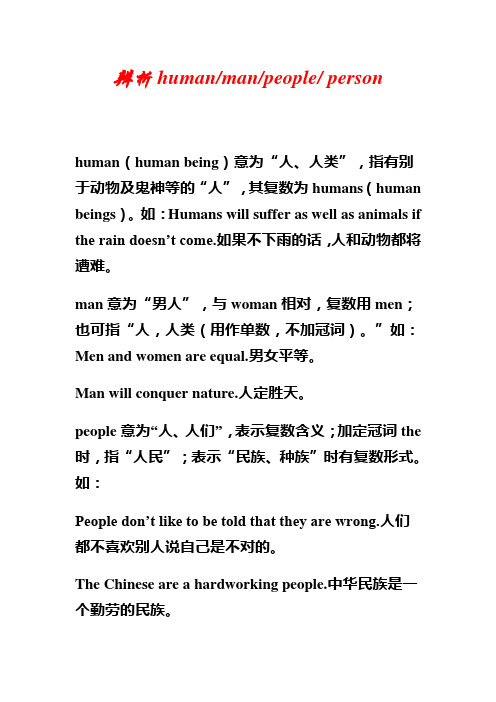
辨析human/man/people/ personhuman(human being)意为“人、人类”,指有别于动物及鬼神等的“人”,其复数为humans(human beings)。
如:Humans will suffer as well as animals if the rain doesn’t come.如果不下雨的话,人和动物都将遭难。
man意为“男人”,与woman相对,复数用men;也可指“人,人类(用作单数,不加冠词)。
”如:Men and women are equal.男女平等。
Man will conquer nature.人定胜天。
people意为“人、人们”,表示复数含义;加定冠词the 时,指“人民”;表示“民族、种族”时有复数形式。
如:People don’t like to be told that they are wrong.人们都不喜欢别人说自己是不对的。
The Chinese are a hardworking people.中华民族是一个勤劳的民族。
person指单个“人”。
如:Who is that person?那个人是谁呢?英语俚语中的动物1. What a stupid ass.(驴)!真是个傻瓜!2. Kate is busy as a bee(蜜蜂).凯特是个大忙人。
3. You dirty rat(老鼠)!你这卑鄙的小人!4. I'm hungry as a wolf!我要饿死了!5. What a turkey!真是个草包!6.a cold fish(高傲自大的人) a poor fish(可怜虫),a big fish (大亨),a cool fish(无耻之徒),a strange fish(奇人、怪人),a loose fish(放荡鬼)等。
但必须注意的是,fish用来指人时形象虽然鲜明,但往往含有贬义。
“人”与“人”的不同用法
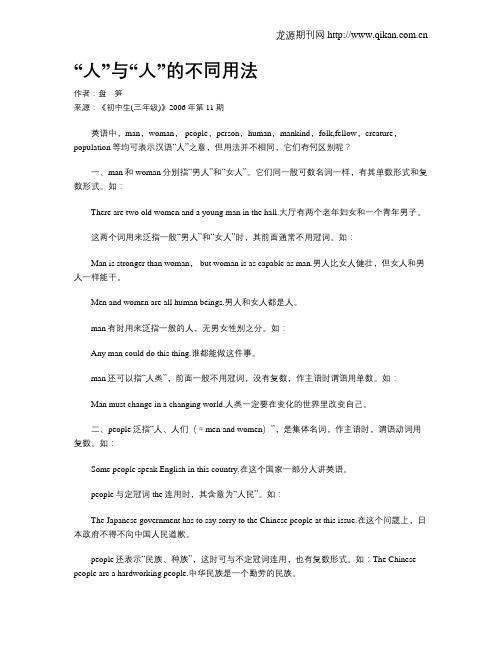
“人”与“人”的不同用法作者:盘笋来源:《初中生(三年级)》2006年第11期英语中,man,woman, people,person,human,mankind,folk,fellow,creature,population等均可表示汉语“人”之意,但用法并不相同,它们有何区别呢?一、man和woman分别指“男人”和“女人”。
它们同一般可数名词一样,有其单数形式和复数形式。
如:There are two old women and a young man in the hall.大厅有两个老年妇女和一个青年男子。
这两个词用来泛指一般“男人”和“女人”时,其前面通常不用冠词。
如:Man is stronger than woman, but woman is as capable as man.男人比女人健壮,但女人和男人一样能干。
Men and women are all human beings.男人和女人都是人。
man有时用来泛指一般的人,无男女性别之分。
如:Any man could do this thing.谁都能做这件事。
man还可以指“人类”,前面一般不用冠词,没有复数,作主语时谓语用单数。
如:Man must change in a changing world.人类一定要在变化的世界里改变自己。
二、people泛指“人、人们(=men and women)”,是集体名词,作主语时,谓语动词用复数。
如:Some people speak English in this country.在这个国家一部分人讲英语。
people与定冠词the连用时,其含意为“人民”。
如:The Japanese government has to say sorry to the Chinese people at this issue.在这个问题上,日本政府不得不向中国人民道歉。
people还表示“民族、种族”,这时可与不定冠词连用,也有复数形式。
- 1、下载文档前请自行甄别文档内容的完整性,平台不提供额外的编辑、内容补充、找答案等附加服务。
- 2、"仅部分预览"的文档,不可在线预览部分如存在完整性等问题,可反馈申请退款(可完整预览的文档不适用该条件!)。
- 3、如文档侵犯您的权益,请联系客服反馈,我们会尽快为您处理(人工客服工作时间:9:00-18:30)。
human, human being, human race, mankind, man, person, people, soul, creature
(1)human adj . 人的,有关人的;人类的;有人性的。
该词还可作名词表“人”,常用该词构成a human being一个人, human beings人们, human race 人类,在将人与动物、
神仙、鬼等比较时常用human, 其复数形式为humans。
如:
Are robots as clever as humans?机器人跟人一样聪明吗?
(3)person 可以指man, woman或child,其复数形式常是people,用persons 则强调数量的概念。
“一个人”是a person, 不能说a people, “两个人”可说two persons/people。
(4)man的单数形式并其前不加冠词可表“人类”,相当于mankind。
如:
Man’s knowledge of things constantly develops . 人类的认识总是不断发展的。
(5)people 泛指“人们”,the people 人民,人们,a people, peoples民族。
如:
The Chinese are a hardworking people . 中华民族是勤劳的民族。
serve the people为人民服务,many people at the meeting . 出席会议的人很多。
the English-speaking peoples 使用英语的各民族。
(6)soul, creature 在书面语中常表“人”,常与数词连用并带感情色彩。
soul还表“首脑,核心人物”如;
Won’t someone help that poor pretty creature?难道没人帮助那可怜但美丽的人吗?
The ship was lost off the coast with all souls . 这条船在沿海失事,船上的人全部遇难。
an important soul in the strike 罢工中的核心人物。
